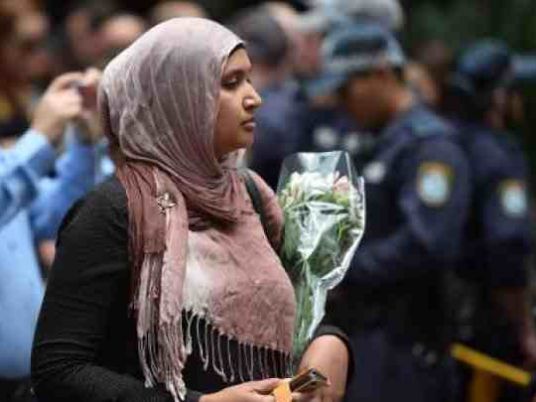
One of the bouquets left on Tuesday in a sea of flowers at the site of the Sydney siege read "I will ride with you." It was as much a wholehearted message to Australia's Muslim community as to the incident's victims.
Those words are the theme of a Twitter campaign of solidarity, offering to accompany any Muslims who fear venturing onto public transport at this time, in case of a public backlash after Monday's deadly cafe siege by an Iranian-born extremist.
The campaign has raised hopes that Australia, a nation forged by waves of immigration down the decades, will be drawn together by the tragedy and not torn apart.
Mirella Rigo, overcome with emotion, rushed through the crowd of people paying their respects on Tuesday morning to embrace a Muslim woman at a makeshift memorial near the Lindt cafe in downtown Sydney's Martin Place.
"It's heartfelt," she said. "I feel for these people. I think to make them see they are not responsible for this."
Mariam Veiszadeh, from the Islamophobia Register which collates reports of anti-Muslim sentiment, told AFP she had been touched by the reaction from ordinary Australians.
"The tragedy that unfolded in Sydney yesterday has really brought Australians together — irrespective of our backgrounds, religious or racial identities," she said after placing flowers at the Martin Place memorial.
"And I'm really hoping that we take this feeling throughout the rest of the week."
The 490,000-strong Muslim community has been battling the emergence of Islamic State this year and its growing impact on disenchanted youth, who have been targeted in sophisticated social media drives to radicalise them.
Some have succumbed and fled to Syria and Iraq while more than 70 others have had their passports confiscated, sparking fears over possible attacks on Australian soil, with IS leaders calling online for public beheadings or executions.
After counter-terror raids in September, there was a backlash that saw several mosques vandalised. Anxious to contain any damage from Monday's tragedy, more than 40 Muslim groups quickly issued a statement decrying extremists "who seek to destroy the goodwill of the people of Australia".
– 'A sick individual' –
The hostage-taker was widely identified as a self-styled Islamic cleric called Man Haron Monis. He had displayed an Arabic flag during the siege, and was killed along with two of his 17 hostages as police stormed the cafe early on Tuesday.
Officials said he had no clear links to Islamic State or other jihadist groups, but was rather a mentally unstable man with extremist views and a history of violence.
Australia's race discrimination commissioner Tim Soutphommasane said he was heartened by the Twitter campaign, adding: "Let's not allow fear, hatred and division to triumph."
The mood was set by the Twitter hashtag #illridewithyou, which Tessa Kum tweeted on Monday to counter concern about an anti-Muslim backlash. Tens of thousands have tweeted their support.
Kum said she had been inspired by another commuter.
"She'd done a very simple thing — she had seen a distressed Muslim woman on a train take off her hijab and had approached that woman at the train station and simply said, "Put it back on, I'll walk with you". That broke my heart a little bit," Kum told ABC radio.
So far, there has been little public criticism of Muslims although the Queensland president of the anti-immigration One Nation party took aim at Islam.
"Already the Islam apologetics on national TV are trying to suck up to Muslims and are telling us this is just a lone gunman, a 'lone wolf' and nothing to do with Islam," Jim Savage told reporters.
Neil Fergus, chief executive of risk consultancy Intelligent Risks, who has been working with the Muslim community, said that of all the Muslims in Australia, an estimated 250 or fewer were considered a concern by authorities.
"The Muslim community has pulled together in a remarkable way and people are expressing sympathy," he told AFP.
"He (Monis) was clearly a risk to the community, but not because he had direct links with Islamic State. He was a sick individual."
